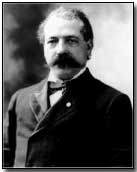Primary Documents - Samuel Gompers on U.S. Policy of Conscription, May 1917
 Samuel Gompers was a
prominent U.S. trade union leader in the years prior to and during World War
One. As president of the
American Federation of Labor (AFL) from its inception in 1888 Gompers was a
moderate trade unionist, believing that employee relations could best be
encouraged through an effective dialogue between management and workers.
Samuel Gompers was a
prominent U.S. trade union leader in the years prior to and during World War
One. As president of the
American Federation of Labor (AFL) from its inception in 1888 Gompers was a
moderate trade unionist, believing that employee relations could best be
encouraged through an effective dialogue between management and workers.
Such views inevitably led the AFL to be associated in the minds of many with the Democratic Party - and indeed the AFL publicly supported the 1908 Democratic presidential candidate, William Jennings Bryan, on account of his pro-union policies.
Although a committed pacifist he recognised the advantageous possibilities open to U.S. labour as a consequence of the declaration of war in Europe in August 1914. His personal views notwithstanding, he was nevertheless keen that his union's membership - comprised of some 2.4 million predominantly white skilled workers - should benefit from the boom in orders placed by the belligerent powers in Europe.
The U.S. did not enter the war until April 1917; however Gompers was one of many campaigners encouraging a state of war readiness in 1916. Accordingly he was appointed as an advisor to the Council of National Defense in October 1916.
Gompers worked closely with U.S. propagandist George Creel to encourage domestic support for the war effort once President Wilson formally declared hostilities in April 1917.
Reproduced below is the text of a speech by Gompers supporting a policy of conscription in the U.S.
Samuel Gompers on U.S. Conscription Policy, 1917
I have counted myself happy in the companionship of the men and women who called themselves pacifists. There was not a State or national or international peace society of which I was not a member, and in many instances an officer. As a trade unionist, with its practices and its philosophies, I have been in happy accord with our movement for international peace.
At a great gathering in Faneuil Hall, Boston, some years ago, I gave utterance to my soul's conviction that the time had come when great international wars had been put to an end, and I expressed the opinion that in the last analysis, if those who are the profit-mongers by "war" undertook to create a war, the working people of the countries of the world would stop work simultaneously, if necessary, in order to prevent international war...
I was sent as a delegate from the American Federation of Labor to the International Congress of Labor in 1909, held at Paris, France, and there at that conference, incidental to it, there was arranged one of the greatest mass meetings I have ever attended, at which the representatives of the labour movement of each country declared that there would not be another international war.
And I went home, happy in the further proof that the time of universal peace had come. And I attended more peace conferences. I was still firmly persuaded that the time had come, and until 1914 I was in that Fool's Paradise.
I doubt if there were many who were so thoroughly shocked to the innermost depths of their being as I was with the breaking out of the European War. But it had come!
And as it went on, ruthlessly, we saw a terrific conflict in which the dominating spirit was that the people attacked must be subjugated to the will of the great autocrat of his time regardless of how our sympathies ran, and that men who had given the best years of their lives in the effort to find some means, some secret of science or of nature, so that the slightest ill or pain of the most insignificant of the race might be assuaged, turned to purposes of destruction.
At the call of this autocrat, His Imperial Majesty the Emperor of Germany, men were set at attack, and we found that these very men were clutching at each other's throats and seeking each other's destruction...
The United States has declared that she can no longer live in safety when there is stalking throughout the earth this thunderous machine of murder. The United States authoritatively has declared that peace is desirable and should be brought about, but that peace is impossible so long as life and liberty are challenged and menaced.
The Republic of the United States has cast her lot with the Allied countries fighting against the greatest military machine ever erected in the history of the world.
I am made ill when I see or hear any one suffering the slightest pain or anguish, and yet I hold that it is essential that the sacrifice must be made that humanity shall never again be cursed by a war such as the one which has been thrust upon us.
Source: Source Records of the Great War, Vol. V, ed. Charles F. Horne, National Alumni 1923
The Russian war ace Alexander Kozakov claimed 20 victories during the war; his nearest compatriot, Vasili Yanchenko, claimed 16.
- Did you know?
